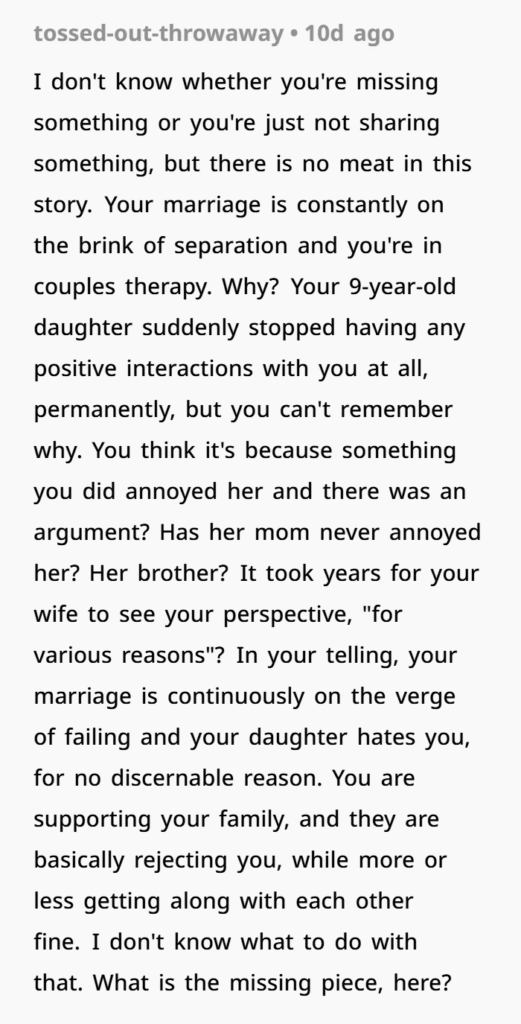When Being a Dad Feels Like Being a Doormat: One Father’s Breaking Point






Let’s dive deeper into what’s really going on here. Because stories like this? They’re not as rare as they seem.
👨👧 The Disconnected Father-Daughter Relationship
Father-daughter relationships are usually portrayed as sweet, protective, and full of love—but sometimes, they spiral into something unrecognizable. In this case, the daughter’s shift from closeness to contempt is particularly jarring. It started around age 9, which developmentally is a major transitional period. Children begin asserting independence, but extreme hostility and long-term alienation may suggest deeper behavioral or psychological issues.
One of the most striking things here is the father’s suspicion of Borderline Personality Disorder (BPD). While it’s important not to self-diagnose anyone—especially a teenager—BPD often includes intense emotional swings, fear of abandonment, black-and-white thinking, and unstable relationships. If a child begins idolizing one parent and demonizing the other, especially without clear cause, it’s worth exploring this further with a licensed clinical psychologist.
Even though she’s had therapists, the dad says “nothing came out of it.” That could mean the sessions weren’t long-term, not consistent, or perhaps focused on surface-level problems. Not all therapy is created equal. Teens with possible BPD symptoms need structured, specialized therapy—like Dialectical Behavior Therapy (DBT)—which has shown excellent results in emotional regulation and repairing damaged relationships.

😞 When One Parent Becomes the Family Scapegoat
In dysfunctional family systems, sometimes one member becomes the scapegoat—the person blamed for problems or just emotionally discarded. This father’s story fits the profile. He’s ignored, talked over, and belittled—even in public settings. His emotional needs aren’t just unmet; they’re invisible.
This kind of emotional neglect can lead to serious mental health consequences: depression, anxiety, and even suicidal ideation in some cases. Studies have shown that long-term emotional rejection within families can be just as damaging—if not more so—than physical abuse. You can’t see the scars, but they’re there. And when it’s happening in your own home, the place where you’re supposed to feel safe, it’s even worse.
🧠 Mental Health and Male Vulnerability
There’s another layer to this: male mental health. A lot of men suffer silently. Society teaches guys to “tough it out” or “be strong,” even when they’re emotionally falling apart. This dad admitted he’s been struggling with depression and self-worth for years. And the constant barrage of coldness from his daughter, with little to no support from his spouse, only makes it worse.
It’s no surprise he’s considering moving out. That’s not cowardice—it’s self-protection. Sometimes, you have to step away from the source of harm to heal. In fact, experts agree that establishing boundaries is a healthy response to emotional abuse, even if it means physical distance from the ones causing the hurt.
💔 Is Moving Out the Only Option?
Let’s be honest—this isn’t just a bad day or a teen going through “a phase.” This is five years of emotional disconnection, disrespect, and psychological wear-and-tear. Still, moving out is a huge decision, especially when it affects minors.
But it might not be as final as it sounds. Some therapists suggest therapeutic separation—a structured break where the parent leaves for a temporary period while both sides reflect, heal, and potentially rebuild the relationship. This can help lower the emotional temperature at home and force a real shift in the family dynamic.
Of course, this only works if both parents are on board. The dad’s wife seems to be coming around—finally calling out rude behavior, and even promising to back up new rules. That’s a start. But if those rules aren’t enforced consistently, and the disrespect continues, then staying might only deepen the dad’s mental health crisis.

🎓 What About the Son?
There’s an undercurrent of concern about the son, too. He’s about to go to college, but the dad feels like his influence is fading there as well. That’s heartbreaking. And maybe it’s a symptom of the larger family dynamic: if one child sees another disrespecting a parent with zero consequences, they may begin doing it too. It’s passive modeling in action.
The father wants to stay in touch with his son. That’s important. Even if he moves out, maintaining communication, showing up for milestones, and being emotionally available can still have a lasting positive impact.
🧭 So What’s the Right Move?
There’s no perfect answer. But here’s a practical approach:
- Set Non-Negotiable Boundaries. The dad’s new rule—“respect is expected, disrespect has consequences”—is fair and long overdue.
- Enforce Consequences. If his daughter’s rude, and there’s no follow-through, then the cycle continues. That’s why his wife’s support is key.
- Prioritize Mental Health. Whether it’s individual therapy, group support for fathers, or even a short-term retreat—healing has to start now.
- Keep Doors Open, Not Walk Away Cold. He may not want a relationship with his daughter right now—and that’s valid—but keeping some channel open for the future (letters, check-ins, therapy invitations) may prevent long-term estrangement.
He gave some more info in the comments








Sometimes, being a parent means knowing when to fight for your child—and when to protect yourself from them. This dad’s story isn’t about giving up. It’s about surviving in a family where love feels one-sided and respect is long gone. No one deserves to be invisible in their own home.
And if you’re in a similar spot? You’re not alone. There’s help, and there’s hope. You just have to take that first step.

